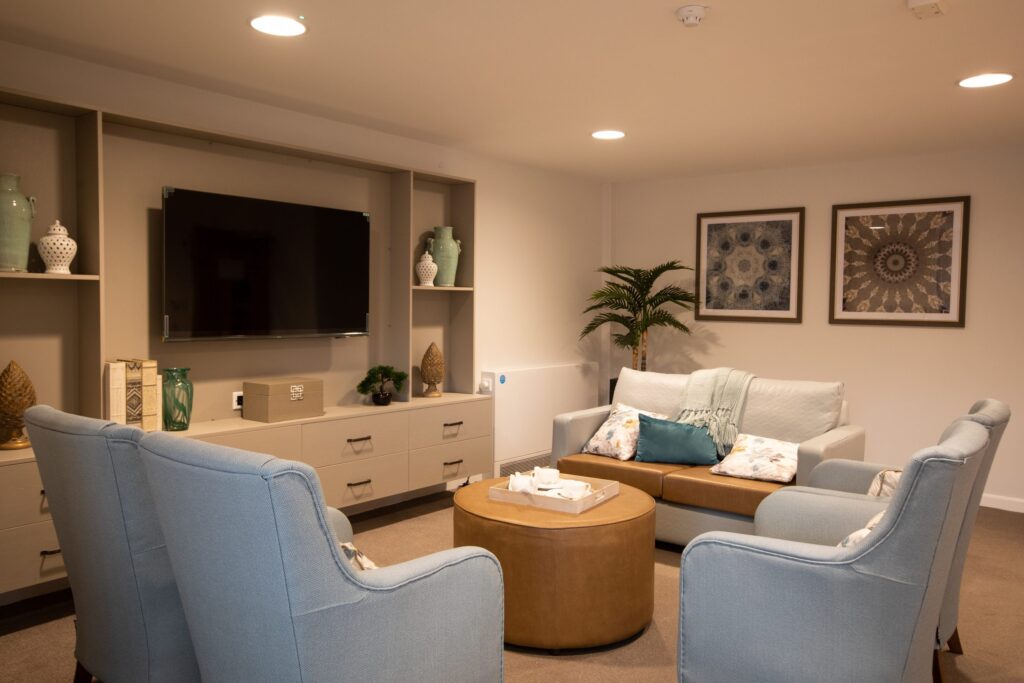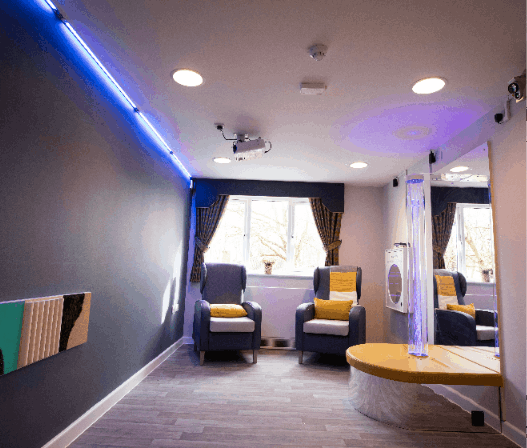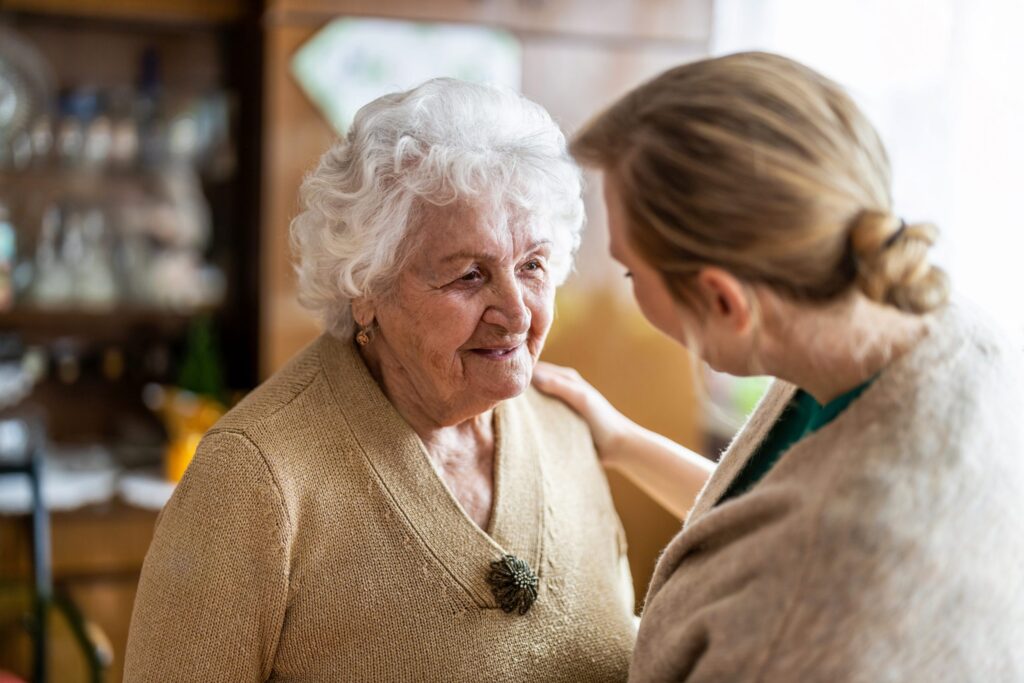
Creating Peaceful Routines in End of Life Care
As someone approaches the final stages of life, the world around them can often feel overwhelming – full of change, uncertainty and emotional weight. In the final stages of life, a calm and consistent daily rhythm can make a significant difference to someone’s overall sense of wellbeing. For individuals receiving end of life residential care, gentle routines help reduce uncertainty, promote dignity, and offer comfort, thereby enhancing the patient's quality of life during what can be an emotionally and physically challenging time.
As people grow more frail or experience cognitive changes, they often rely more heavily on familiarity to feel secure. Predictable routines – such as waking at a regular time, enjoying meals in a familiar setting, and seeing consistent care staff – create a sense of safety. This structure isn’t rigid or rushed; instead, it provides a soft framework to the day, helping to ease anxiety and maintain a sense of control.
A study published in Age and Ageing by the British Geriatrics Society in 2020 found that structured routines in residential care settings were linked with reduced restlessness and improved emotional wellbeing among those receiving palliative care. These patterns can help orient residents, support better sleep, and create space for meaningful moments to unfold naturally.
Importantly, this approach allows care to be delivered in a thoughtful, unhurried way. It ensures that residents are not overwhelmed with stimulation or change, but instead experience each part of the day with gentle predictability. For many families, knowing that their loved one is supported by this kind of consistent, person-centred care brings reassurance during a difficult time.
The Difference Between Palliative Care and End of Life Care
Palliative care and end of life care are closely connected, but they are not quite the same. Palliative care is a broader approach that focuses on improving quality of life for people living with serious or long-term conditions, such as advanced cancer. It can be provided over weeks, months or even years, alongside other treatments, and helps to manage pain, symptoms and emotional wellbeing. Palliative care professionals also support the specific needs of cancer patients in end-of-life care, ensuring they receive the necessary psychological and physical support. End of life care, or hospice care on the other hand, is a part of palliative care that supports someone in the final stages of life – usually the last year, months or weeks. The focus is on comfort, dignity and support for both the dying person and their loved ones during this important time.
Personal Comfort at the Heart of Care
While routines are helpful, it is the personalisation of those routines that brings true comfort in end of life care. This stage of life is deeply individual, and care that honours each person’s preferences, personality and life history even when they're coping with a terminal illness.
Personalised care involves understanding what brings each person comfort and aligning it with the patient’s preferences – whether that’s the routine of a morning cup of tea, the softness of a favourite blanket, or the quiet presence of music in the background. These details may appear small, but they contribute to a resident’s overall sense of peace and dignity.
Assessing the patient's ability to participate in decision-making is crucial for ensuring that their care aligns with their wishes. Guidance from the National Institute for Health and Care Excellence (NICE) highlights that end of life care should be based on what matters most to the individual. This includes their values, cultural or spiritual beliefs, and preferences for how care is provided. In practice, this might mean adjusting daily routines to suit when someone prefers to rest, how they take their meals, or who they like to spend time with.
Families often find it comforting to see their loved one recognised in such personal ways. Rather than being treated according to a fixed routine, residents are supported in a way that reflects who they are and what brings them peace. This focus on individual comfort helps make residential care feel less clinical and more like home, especially in the later stages of life when familiarity, compassion and attentiveness are needed most.


Involving Family Members in the Routine
When someone enters end of life residential care, it can be an emotional shift not just for them, but for their loved ones too. Many families worry about feeling distant or unsure of how best to stay connected. That’s why involving families in the daily routine – in ways that feel natural and reassuring – is such an important part of good care. The presence of support people, such as family or close friends, can provide essential emotional support during these critical times.
A family member often brings a sense of familiarity and continuity that can be incredibly comforting. A loved one’s voice, touch, or presence can offer something no amount of clinical care can replicate. Whether it’s sharing a quiet conversation in the afternoon, holding hands during a favourite TV programme, or simply sitting together in the same room, these moments help maintain bonds in a way that feels deeply human.
Residential settings that support end of life care are increasingly recognising the importance of family involvement and encouraging gentle participation in daily routines. This doesn’t need to be formal or structured. Sometimes, just being there for mealtimes or popping in for a morning visit becomes part of the rhythm of the day. These shared experiences can provide comfort for both the resident and their loved ones. Social care professionals also play a crucial role in supporting families and residents, offering assistance that complements the involvement of family and friends.
Open communication plays a key role. Families are often guided through what to expect during this time, emotionally, physically, and practically, which helps ease some of the anxiety that can come with change. Knowing what a typical day looks like and how their loved one prefers to spend it allows families to feel more connected and informed.
Support is not just for the resident. Good end of life care includes space for families to ask questions, express their feelings, and receive emotional support. Many care teams are trained to recognise the stress and uncertainty families face and are there to offer quiet guidance, without pressure or expectation.
There’s also an understanding that not all families will be able to visit regularly, or may find certain stages difficult. In these cases, care teams may help with phone calls, memory books, or simply keeping families updated with gentle honesty. What matters most is maintaining the sense that their loved one is being cared for with warmth and respect. At its heart, involving families in the routine is about honouring relationships. It helps transform care from something that happens to a person into something that is shared, offering comfort, connection, and a sense of home right to the very end.

Peaceful Environments Make a Difference
The physical environment in end of life residential care plays a quiet but powerful role in how someone experiences their final days, contributing significantly to comfort care. While care itself often takes centre stage, the surroundings – the sights, sounds, textures and spaces – can gently shape how a person feels, moment by moment. Thoughtfully designed environments help create calm, reduce anxiety and offer a deeper sense of peace. In addition to creating a peaceful environment, managing other symptoms such as dyspnea, gastrointestinal issues, fatigue, depression, and anxiety is crucial for comprehensive care.
Sensory rooms and therapeutic gardens are two examples of how residential settings can use space to enhance comfort and wellbeing at the end of life. These areas are not just about aesthetics – they’re created with purpose, offering soothing stimulation for the senses and a place to simply be. Effective pain control is also essential in these settings to ensure that residents experience the highest level of comfort possible. Sensory rooms are designed to engage residents in a gentle, calming way. Soft lighting, familiar scents, textured fabrics and quiet sounds come together to create a space where someone can relax without pressure or conversation. For individuals who are frail, in pain, or living with dementia, this kind of controlled, low-stimulation environment can bring a sense of safety and ease. These rooms can also help with managing restlessness, especially for those who find traditional communal areas too busy or overwhelming. Research has shown that sensory interventions may reduce distress and support emotional comfort in palliative and dementia care settings. Whether it’s the sound of waves, the scent of lavender, or the feel of a soft blanket, each element can be tailored to support the individual.
Just as important are the gardens and outdoor spaces, which offer something uniquely restorative. Nature has long been known to support emotional wellbeing, and this remains true even in the later stages of life. The feeling of sunlight on the skin, the sound of birds, or the scent of flowers in bloom can awaken memories and bring quiet joy. Gardens in care settings are often designed with accessibility in mind – with wide, level paths, seating areas, raised planters and shelter from wind or rain. For some residents, time in the garden may be part of a daily routine; for others, it’s a peaceful retreat when they feel up to it. Family members often value these spaces too, as they allow for gentle connection away from the more clinical parts of care.
Whether indoors or outside, having calm, comfortable environments isn't about decoration; they reflect the belief that comfort comes from more than medication or medical care. It comes from feeling safe, at ease, and gently supported by the world around you.
Supporting Emotional and Spiritual Needs
End of life care is not only about managing physical symptoms – it’s about supporting the whole person, including their mental health. This includes their emotional wellbeing, their sense of identity, and for many, their spiritual beliefs. These aspects of care are deeply personal, and when approached with sensitivity and respect, they can offer comfort, connection and peace during life’s final chapter. Healthcare professionals play a crucial role in providing this emotional and spiritual support, ensuring that care is compassionate and tailored to individual needs.
People nearing the end of life often reflect on the meaning of their experiences, their relationships, and their hopes for those they’re leaving behind. These thoughts and emotions may bring about sadness, fear, or uncertainty – but they may also bring calm, acceptance and a desire to connect. In residential care, the opportunity to be heard and gently supported through these feelings can make all the difference. Healthcare professionals often face ethical dilemmas in these situations, needing to balance empathy with adherence to the patient's wishes, especially when autonomy is compromised.
Emotional support may take many forms. Sometimes, it’s a quiet conversation with a trusted carer. Other times, it’s simply having someone sit nearby in silence. Trained staff often use active listening and a compassionate presence to help residents feel safe enough to share their thoughts, or to sit quietly when words are not needed. Creating a space where individuals feel truly seen and accepted, just as they are, can be as meaningful as any treatment or intervention.
Spiritual care, too, plays an important role. For some, this may involve religious practices such as prayer, readings, or visits from a chaplain or faith leader. For others, spiritual support may be found in music, time in nature, or reflecting on the life they’ve lived. What matters most is that individuals are given the choice to explore these aspects of care in their own way, without pressure or assumption.
The NICE guidelines on end of life care emphasise the importance of recognising and responding to each person’s spiritual, cultural and emotional needs. This includes offering appropriate support and involving family members where helpful, while always respecting the wishes of the individual. Families may also need emotional support of their own. Many experience feelings of helplessness, guilt, or anticipatory grief. Residential care settings often provide space for these feelings to be acknowledged, offering guidance and gentle reassurance. Bereavement support may also be available, helping relatives navigate the days and weeks that follow with the same kindness and understanding shown throughout the care journey.
Quiet Moments That Matter
End of life care is never just about the clinical side of things; it’s about creating a space where someone can feel calm, comforted, and at peace in their final days, with effective symptom management playing a crucial role. Gentle routines, familiar surroundings and the right emotional support all work together to bring a sense of dignity and safety for the person receiving end of life care and their family.
Research suggests that these approaches significantly enhance the quality of life for dying patients. Every person deserves to feel known, respected, and truly cared for in this stage of life. And with the right support in place, this time can be one of connection, reflection and quiet meaning. If you’re considering end of life care for a loved one and want to know more about the peaceful, person-centred approach we take at Maplebrook Care Home, our team is here to help. We understand how emotional this time can be and are always happy to talk you through the care we offer. To find out more or arrange a visit, please contact us today – we’re here when you’re ready.
References and Further Reading
British Geriatrics Society (2020)
End of Life Care in Frailty: Care homes
NICE – National Institute for Health and Care Excellence (2019)
End of life care for adults: service delivery (NG142)
Marie Curie UK
What is End of Life Care?
NHS England
Palliative and end of life care explained
Age UK
Information and advice on end of life planning and care
Hospice UK
Supporting people at the end of life: information for families and carers
